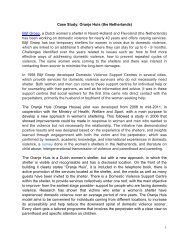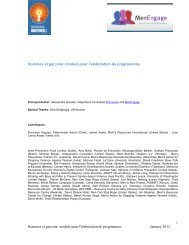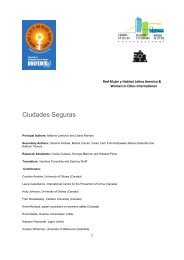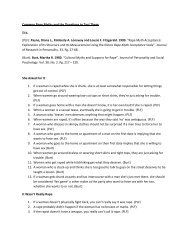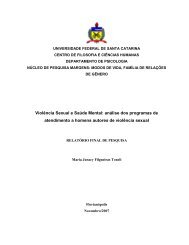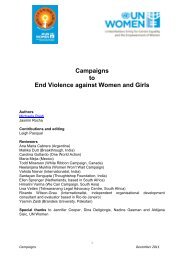Download PDF - Virtual Knowledge Centre to End Violence against ...
Download PDF - Virtual Knowledge Centre to End Violence against ...
Download PDF - Virtual Knowledge Centre to End Violence against ...
Create successful ePaper yourself
Turn your PDF publications into a flip-book with our unique Google optimized e-Paper software.
� Have any studies explored knowledge, attitudes and practices of men in relation<br />
<strong>to</strong> violence <strong>against</strong> women in the target region? Country? State/province?<br />
Community?<br />
� Have there been any studies or surveys on perpetra<strong>to</strong>rs or on identifying highrisk<br />
fac<strong>to</strong>rs that can contribute <strong>to</strong> violence <strong>against</strong> women?<br />
� Have there been any studies or surveys on identifying protective fac<strong>to</strong>rs that<br />
contribute <strong>to</strong> a decrease of violence <strong>against</strong> women?<br />
� Does the government have a national plan <strong>to</strong> address the issue of violence<br />
<strong>against</strong> women? At the national level, are there policies, plans or programmes<br />
(e.g. in the health, education or judicial sec<strong>to</strong>rs) <strong>to</strong> address the problem of<br />
violence <strong>against</strong> women? What are these policies and how are they applied in<br />
the community of intervention? Are there any policies that relate specifically <strong>to</strong><br />
men and violence <strong>against</strong> women or are men addressed in the other existing<br />
frameworks?<br />
Boys and men‟s perceptions about violence <strong>against</strong> women and girls:<br />
� What does the community think about violence in general?<br />
� Are men aware of the magnitude of the problem? Of its consequences?<br />
� What are boys‟ and men´s main concerns regarding violence in general?<br />
� What are boys‟ and men‟s main concerns regarding violence <strong>against</strong> women?<br />
What are their concerns regarding related issues (e.g. education of girls, women<br />
in formal or informal employment, women‟s safety in public spaces, sex work,<br />
sexual relations, child marriage and parenting, reproductive and sexual health,<br />
HIV and AIDS, among others)?<br />
� What are the prevailing norms related <strong>to</strong> masculinities and gender in the<br />
community? For instance, are boys and men expected <strong>to</strong> be aggressive <strong>to</strong>wards<br />
women? Are they expected <strong>to</strong> have multiple sexual partners?<br />
� How do these norms affect relations between men and women?<br />
� Are there opportunities for change through „voices of resistance‟? For instance,<br />
there may be individuals, community leaders or groups who differ from the<br />
prevailing gender norms and who can be tapped <strong>to</strong> promote wider change.<br />
� How do boys and men assess the types of interventions (if any) that have been<br />
carried out <strong>to</strong> address violence <strong>against</strong> women in their communities or country?<br />
� Are there particular forms of violence <strong>against</strong> women or girls that are of greater<br />
community concern or of greater concern <strong>to</strong> men and boys?<br />
� Have they been involved in any such intervention? Would they like <strong>to</strong> be?<br />
� What role do men and boys think they could play in preventing violence <strong>against</strong><br />
women?<br />
� How do they suggest that the programme reach additional men and boys?<br />
The community‟s perceptions and existing actions on the issue:<br />
Men and Boys <strong>Knowledge</strong> Module January 2012 20



